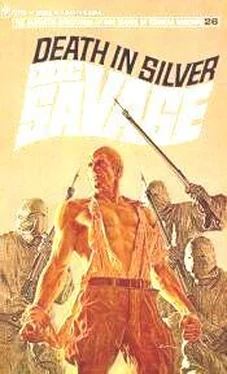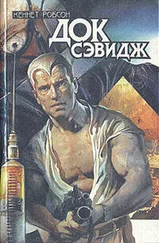Ull seemed dazed. "Boss, do you mean there is something bigger behind this?"
"Yes!" snarled the other.
Ull's confusion began to turn to anger. "You were using my brains and inventive ability, eh? Using it for your own benefit! Listen, I do not like … "
"Shut up!" gritted the whispering one. "I intended for you to pull a robbery now and then — like that armored truck job — to pay expenses. But the big money was not to come from that trivial stuff!"
Ull snapped, "If you call what we got last night 'trivial' … "
"It's trivial alongside what I plan!" interjected the Master. "But we'll go into this later. Your job now is to get Doc Savage!"
Ull stood perfectly still for some seconds, glaring at the telephone. He had thought he was fully in the confidence of this mysterious chieftain who kept in the background. He had just discovered that such was not the ease. It made him mad!
"Doc Savage will be taken care of!" Ull growled. "Then there's got to be a new deal on splits. I didn't know about this so-called 'big stuff' you planned to pull. What is it?"
"I'll tell you after you get through with Savage," the other delayed.
And the telephone conversation ended with that.
Doc Savage was giving orders as he drove through the early morning fog that hung like a stuffing of wet cotton in the New York streets. The bronze man was alone. The machine which he drove was not his roadster but a vehicle with an appearance totally foreign to his character.
The car was a slightly shabby laundry truck with a noisy motor and a manner of jolting over cobbles in a manner which seemed most uncomfortable. The cab windows — being extraordinarily grimy — made it difficult for the driver to be observed.
The vehicle was deceptive. The noise was not actually in the motor — which was huge and powerful — but was created by a mechanical device. The cab and body were of armor steel; the windows thick and proof against anything less than a tank-rifle slug; and the machine could travel nearly 100 mph!
In giving commands, Doc Savage was utilizing a 2-way radio apparatus. Just now, Monk's voice — small and disgusted — was coming from the speaker.
"Listen, Doc," Monk demanded. "What was the idea of leaving us behind?"
"I want you to do some work," Doc told him. "But first, I want you to ask Hugh McCoy and Rapid Pace if either of them left Headquarters while you and I were out on the river bringing up that small metal box."
There ensued a brief pause while Monk relayed the question. There was sharp interest in the homely chemist's child-like voice when he spoke.
"Rapid Pace was out for a while right after we left," he declared. "He says he went to get some cigarettes."
"Have you seen him smoking?" Doc queried.
"No," Monk replied. "I asked him about that, and he said he had been too excited to smoke. Listen Doc, I'm wondering."
"Wondering what?"
"Somebody must've tipped them damn silvermen in their submarine that we were going to be on the river!" Monk paused for dramatic effect. "Do you reckon Pace could have slipped out and given them the tip?"
Doc said, "From now on, watch Pace very closely."
"Will I!" Monk growled.
"Is Ham there?" Doc asked.
"Ham speaking," said Ham's voice over the radio.
Despite the outward noise of the laundry truck — the clattering, clanking and popping of the motor and the squeak of the spring — it was comparatively quiet inside the armored van. The radio operated through a loudspeaker; hence conversation could be carried on without great difficulty.
"Ham," Doc directed, "you will make a quick check on Bedford Burgess Gardner. Learn what you can of his character, his associates, his business career, and that sort of thing."
"Certainly," said Ham's melodious orator's voice.
"Check up particularly on how it happens that Gardner's shipping company has become one of the largest in the business," Doc said pointedly. "Concentrate on learning the facts back of the mergers which made it one of the biggest companies."
"So you suspect Gardner?" said Ham.
Doc did not comment on the sword-cane-carrying lawyer's words.
"Get any available details, together with all suspicious circumstances in connection with the mergers," he directed.
"Right-o," said Ham.
Doc clicked 'off' the microphone button. He was driving on Decker Street. Stein Street was directly ahead. The bronze man could see the drug store from which the rodent-voiced man had called.
There was a small crowd in front of the store composed mostly of policemen.
- — — — — — — — — — — — — — — — — — — — — — — — — —
Doc Savage received courteous cooperation from the police, being told without delay that the soda clerk had — upon regaining consciousness — telephoned news of the raid of the silver men.
The clerk — knees still rubbery, stopping to swallow frequently — said the silver gang had entered, seized the individual who was telephoning, then one man had torn up a lot of stock while hunting some aspirin. By way of corroborating himself, the clerk indicated the smashed vaseline on the floor.
"We followed those greasy tracks," the police officer put in at this point. "But they played out very shortly."
Some moments later, Doc Savage departed. When the police would have accompanied him, he requested them to refrain from doing so. The cops looked disappointed. They had hoped to see this remarkable bronze man work.
Doc followed the greasy footprints until they were no longer visible to the unaided eye. This was a bit farther than the officers had been able to trace them. The bronze man was carrying a leather case, and this he now opened.
The portable ultravioletlight lantern came to view, together with another device which resembled welder's goggles except that they were more bulky. Doc switched on the lantern and donned the goggles. The goggles simply made it easier to observe the fluorescing effect — by daylight — of substances in which the ultraviolet light caused the phenomena.
Vaseline being a substance which glows when exposed to ultraviolet light, Doc had little difficulty picking up the footprints which had become invisible to the naked eye. Microscopic quantities of vaseline showed up vaguely under the so-called "black light".
The trail led to the gloomy side-street. Cautious, Doc did not enter. Instead, he circled to the opposite end of the block; used his black light; and — finding no tracks — knew that the quarry had entered a building somewhere in the block.
The bronze man considered. A boat was passing on the river. It was near enough that the watery wash from its bows was audible. This evidence that the river was very near seemed to give Doc an idea.
He moved down the street, careful to keep clear of the street in which the vaseline trail ended. The thick fog swallowed him.
Some minutes later, a creature with an appearance both grotesque and pitiable appeared in the street. The grimy thoroughfare was filled with the whine of a hand-organ.
The organ player was a beggar — a hideous cripple. His legs were drawn up and apparently useless for the fellow dragged himself along by his hands. Judging from the enormous colored glasses under the brim of a shapeless hat, the fellow was also blind.
The hand-organ jangled with a quality as macabre as the personality of the grisly beggar. From time-to-time, the mendicant lifted a face that was purple, lumpy, and utterly repulsive.
Читать дальше


